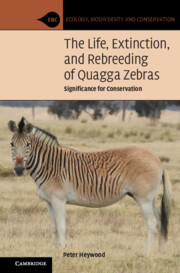Book contents
- The Life, Extinction, and Rebreeding of Quagga Zebras
- Ecology, Biodiversity and Conservation
- The Life, Extinction, and Rebreeding of Quagga Zebras
- Copyright page
- Dedication
- Contents
- Acknowledgments
- Introduction
- 1 Zebras
- 2 Quaggas
- 3 Coat Coloration
- 4 Quaggas, Zebras, and Humans in Southern Africa
- 5 Quaggas Abroad
- 6 Extinction
- 7 Afterlife
- 8 Rebreeding
- 9 Identity and Conservation
- Book part
- Notes
- Bibliography
- Index
5 - Quaggas Abroad
Published online by Cambridge University Press: 30 April 2022
- The Life, Extinction, and Rebreeding of Quagga Zebras
- Ecology, Biodiversity and Conservation
- The Life, Extinction, and Rebreeding of Quagga Zebras
- Copyright page
- Dedication
- Contents
- Acknowledgments
- Introduction
- 1 Zebras
- 2 Quaggas
- 3 Coat Coloration
- 4 Quaggas, Zebras, and Humans in Southern Africa
- 5 Quaggas Abroad
- 6 Extinction
- 7 Afterlife
- 8 Rebreeding
- 9 Identity and Conservation
- Book part
- Notes
- Bibliography
- Index
Summary
At least thirty quaggas were kept in menageries and zoos in six European countries where they were appreciated as exotic animals. They were viewed by royalty, nobles, and ordinary people, portrayed by artists, photographed, and harnessed to pull carriages. Unfortunately, they were not bred in captivity, except for two foals born in the Antwerp Zoo which do not appear to have had any offspring. However, quaggas were mated with other equines: famously, a quagga stallion belonging to Lord Morton was mated with an Arabian horse mare who subsequently bore by an Arabian stallion striped foals that appeared to resemble her earlier quagga mate. Agasse painted “the First Sire” (the quagga), the "Second Sire" (the Arabian stallion), the Arabian mare, and her striped foals, and Charles Darwin postulated that “gemmules” from the quagga stallion had influenced the appearance of the foals born to the horses. This evidence seemed to argue for telegony – an old view of inheritance that the first mate of a female could affect her later offspring. However, Ewart assembled crucial evidence arguing that this conclusion was untenable.
- Type
- Chapter
- Information
- The Life, Extinction, and Rebreeding of Quagga ZebrasSignificance for Conservation, pp. 76 - 84Publisher: Cambridge University PressPrint publication year: 2022

